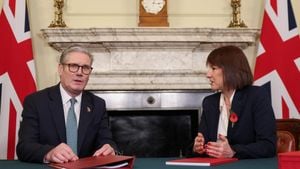Greater Manchester's mayor, Andy Burnham, has officially announced the extension of the bus fare cap at £2, continuing this rate through 2025. This decision stands out amid plans from the national government, led by Prime Minister Keir Starmer, to raise the maximum bus fare cap to £3 as part of broader budget reforms. Starmer’s proposed increase stems from efforts to address significant financial gaps, estimated at £22 billion, within public finances.
Burnham's commitment to maintaining the £2 cap reflects Greater Manchester's unique position relative to other regions, allowing the local government to implement changes aligned with its strategy to centralize bus operations under the Bee Network, aiming for increased accessibility and control over public transport.
The goal behind the current fare policy is to simplify the fare structure across the region, moving toward what Burnham describes as “a low-fare, high-patronage system.” This system is reminiscent of London’s transit success, where stable pricing has led to thriving public transport usage.
"We’re on course to complete the re-regulation of buses on time and on budget early next year, becoming the first city-region outside London to regain full public control over its bus system after four decades of deregulation," Burnham stated confidently. To boost usage, the new Bee Network will not only maintain the £2 bus fares but also introduce contactless payment options similar to those found in London, with specified daily and weekly caps, starting from March 2025.
The framework established from the £2 single fare was initially introduced back in September 2022, along with the debut of the Bee Network, which allows for local management of operations and finances. Burnham noted, "Because of the decisions we’ve taken, GM (Greater Manchester) is positioned differently from other areas across England when it involves bus funding and fare pricing.”
Contrasting with Burnham's stance, the national fare levels reflect broader fiscal strategies. For example, the rise to £3 beginning next year would take effect under the new governmental budget set to be revealed imminently. Critics, including Liberal Democrats, denounced the hike as detrimental, labeling it as “bus tax,” emphasizing how this could negatively impact small businesses and inhibit economic growth.
Meanwhile, the government argues maintaining the £3 cap until 2025 would cost roughly £151 million, which forms part of its strategy to provide over £1 billion to improve local bus services. Transport Secretary Louise Haigh asserted, "Buses are the engines of economic opportunity across the country. We know reliable and affordable bus services are fundamental to keep Britain moving." She emphasized the importance of capping fares to avoid budget discontinuities and provide steady access for residents, especially for rural communities, where transport is often scarce.
Despite the impending national increase, Greater Manchester’s policy highlights how local control over public services can lead to innovative and favorable transport solutions. Burnham’s strategy exemplifies how local governance can work to meet community needs more effectively than overarching national policies.
Residents and commuters are likely to feel the effect of this fare structure differently. For individuals who frequently use the bus, Burnham's approach ensures affordability and consistency, with controlled expenses linked to local economic conditions. Meanwhile, sentiments around fare adjustments could stir unrest among those outside the metropolitan area who find themselves grappling with increased transportation costs.
Burnham remains focused on benefitting from contracts and fare revenues to sustain services without over-relying on governmental subsidies, which have proven unsustainable under previous administration frameworks. He explained how the Bee Network’s financial structure allows for reinvestment back to the local community rather than profiting private operators, enhancing community support and the overall efficiency of the public transport system.
On the potential challenges ahead, Burnham acknowledged the necessity for evaluations and adjustments as the new system develops through 2025. The mid-year review set amid these changes will help guide the future economic prospects of the Bee Network once the initial phases are executed. This approach leads to not only immediate benefits for the commuters but also lays the groundwork for enduring growth and positive shifts within Greater Manchester.
This development occurs as the Greater Manchester transport sector faces distinct issues influenced by national policy shifts, yet Burnham’s proactive measures risk innovatively paving the way for future transportation solutions. The forthcoming adaptations within the Bee Network could also serve as case studies for other regions observing how local policy can substantially deviate from national agendas for the welfare of its residents.
Looking forward, the narrative surrounding bus fares reflects broader discussions about public service funding and the impact of localized governance. Whether other regions will follow Burnham’s model remains to be seen, but such innovative frameworks contribute significantly to the conversation about affordable public transport across the UK.



